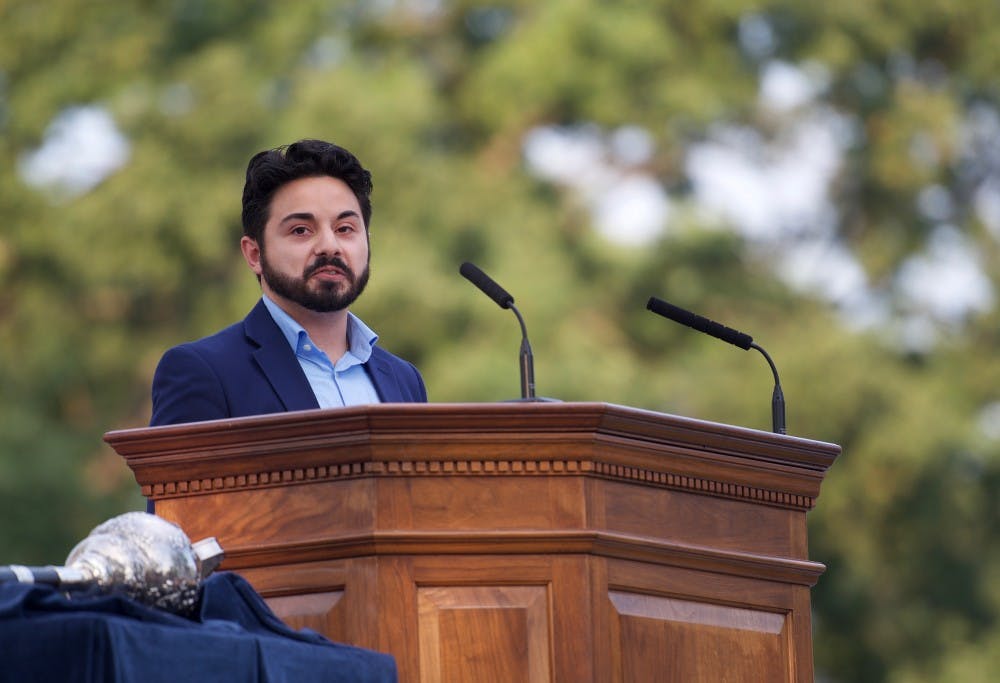I vividly remember my first Student Council meeting on a Tuesday evening in early September 2o15. During the routine Community Concerns part of the meeting, the president welcomed discussion from the audience about issues facing students on Grounds. Ever an eager first-year, I immediately raised my hand and expressed my concern about the lack of physical accessibility around Old Dorms. Older members at the meeting looked around at each other, some snickering and others even rolling their eyes. One person skeptically retorted, “Can we even do anything about that?” I had no idea that the Student Council would typically disregard what seemed like an obvious obstacle to student welfare.
When I first joined Student Council, it seemed as if members were confined to resolving issues of relatively little importance to the student body. Throughout my time at U.Va., the perennial question of what Student Council really does has been one that has felt like a judgment on the work we do. On one hand, yes, we review and approve the status of Contracted Independent Organizations; yes, we allocate nearly one million dollars each year to CIOs to enhance the richness of student life; and yes, we organize the student Activities Fairs at the beginning of each semester; but when we look past the operations mandated by the University, what do we really do?
Trust in institutions at all levels of government has declined especially steeply in recent years. It is easy to see why this skepticism continues to grow. Beyond the rampant dysfunction of federal operations, members of our community have seen firsthand the apparent apathy of Charlottesville leadership toward community concerns. Last year, University officials failed to alert students of white supremacists and neo-Nazis marching on Grounds. When I personally reached out to the then chief of police about Student Council disseminating information to students for their safety, my concern was disregarded. The rest is now history, a stain on our University, our city and our country wherein our institutions failed the people they are meant to serve.
The tragic events of last August shed a light on many of the startling realities of injustice on our Grounds. They also made apparent that people want concrete responses to their concerns, specific policy initiatives to address the issues facing us. Instead of just statements of intangible solidarity and other symbolic acts, people want to know what we are going to specifically do to tackle the problems that affect our community.
Many issues of inequity facing us today have been perpetuated by the feeling that they are not “big” enough or do not affect enough students. In my view, student government serves best when it attends to those who most need support, regardless of how many they number. That’s why we are pursuing the provision of free menstrual hygiene products: because it just makes sense. That’s why we strive to support open housing, because it’s the way forward. That’s why we want to institutionalize student input in the faculty-hiring process: because it shouldn’t take until my third year to be taught by a professor who looks and sounds like me. We are looking to create a Police Advisory Board because our community deserves accountability and communication between UPD and the students they serve. We are also planning to open the Student Council Community Food Pantry this fall to help address issues of food insecurity on Grounds. These are just a few of the key concerns we’d like to address during this term, and we have already taken the first steps necessary to tackle these policy issues.
I have created the Student Life Committee to address issues that affect students daily. It will also serve as the policymaking vehicle within Student Council that tackles issues of economic accessibility in the various facets of the student experience. I have created the Graduate Affairs Committee to focus on adequately serving the specific needs of our graduate student population. Lastly, I have formed the Community Relations Committee to effectively form connections with the greater Charlottesville community and to address hyper-partisanship on Grounds, ensuring that we can have intellectual discourse without fear of reprisal.
Student government should not focus just on popular issues. It must also serve underrepresented communities who have been marginalized by institutional practices implemented before people of color and women were admitted to the University. We do not promise Student Council to be perfect, but we do promise to remain focused on the issues we have set before ourselves. We promise to push Student Council returns to its roots as a student government that advocates first and foremost on behalf of students.
Student self-governance is only as powerful as our ability to believe we can govern ourselves and determine our destinies at this University. We are raising the bar for ourselves because we aim to accomplish many things. On a regular basis over the course of this Student Council term, you will hear from someone on Student Council who will discuss an issue that we are pursuing. This introductory piece is a promise to keep in touch and to keep the conversation going on issues that affect students, no matter how “big” or “small.”
Alex Cintron is a fourth-year College student and Student Council president.







